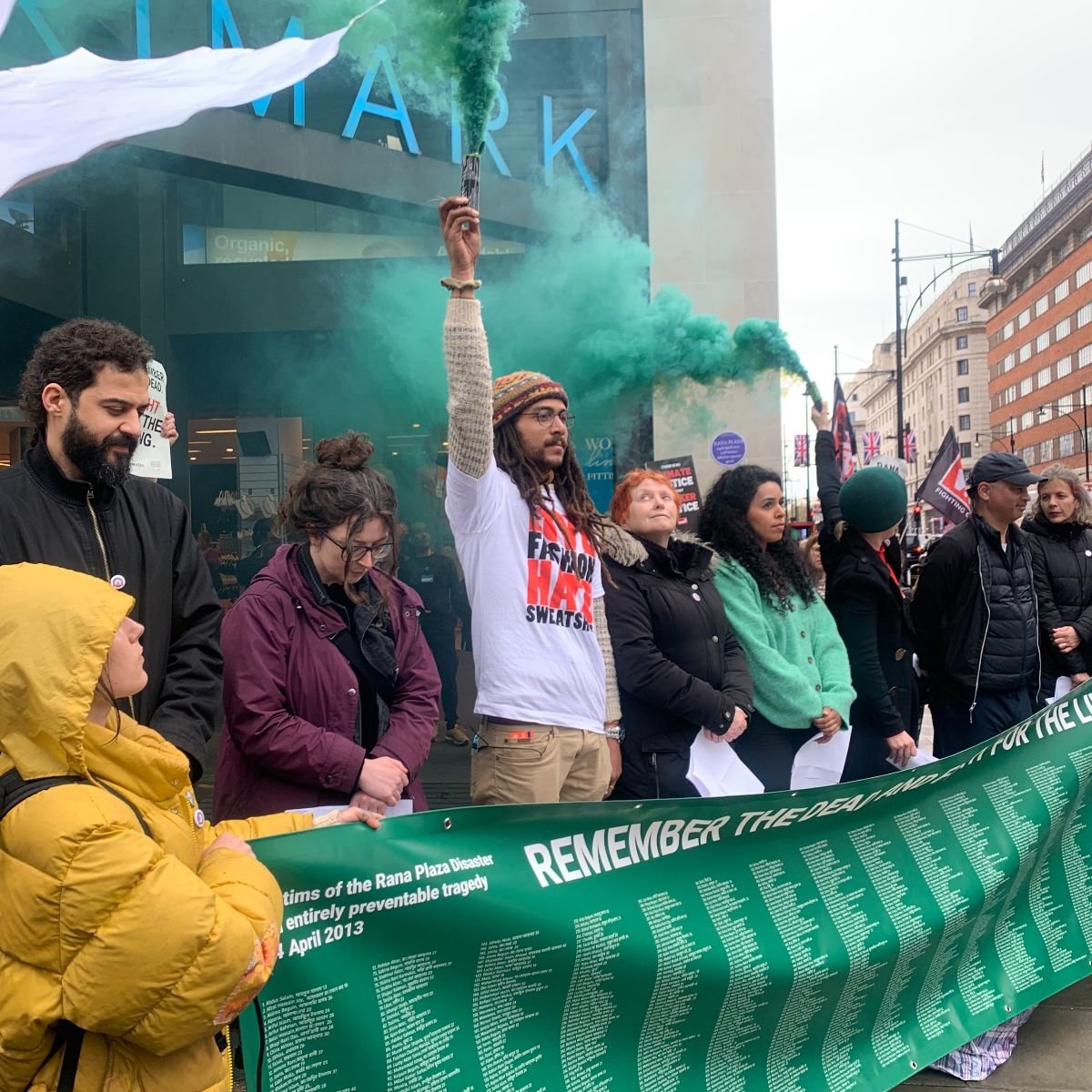Rana Plaza, 10 Years On
Image: Labour Behind The Label - Angela Christofilou.
10 years ago in April 2013, the Rana Plaza building in Bangladesh collapsed, adding the names of more than 1,000 women and men who have been killed in fashion supply chains to a list of many others who have suffered the same fate over the last decade. While the tragedy focused the world's attention on working conditions in globalised supply chains, workers are still facing violations to their rights to a living wage, a safe working environment and reasonable working hours, on a daily basis.
This Sunday, protestors gathered outside a number of fashion stores on Oxford Street, in a 'Cost of Fashion' walking tour, to commemorate the 10th Anniversary of the factory collapse and to honour the lives of the 1138 garment workers who were killed.
Organisers Rana Plaza Solidarity Collective (which is made up of the following organisations and individuals: Rainbow Collective, Traid, Nijjor Manush, Re-Make, Labour Behind the Label, War on Want, Oh So Ethical, No Sweat, Tansy Hoskins, Venetia La Manna) are calling on all clothing companies to sign up to the International Accord, to ensure a disaster like Rana Plaza never happens again. A number of brands including ASDA, IKEA, and Levi’s have not yet signed this binding agreement to improve workers’ safety in their supply chains.
Tyrone Scott from War on Want, one of the organisations in the Rana Plaza Solidarity Collective said:
“The deadly Rana Plaza disaster was not an unavoidable accident – it was an entirely preventable disaster. Rana Plaza workers who made clothes for several UK high street fashion brands had previously raised safety concerns but were ignored. A decade on and garment workers are still facing unsafe working conditions and poverty wages. Clothing brands must urgently sign the International Accord on Fire and Building Safety and commit to guaranteeing safe workplaces, for genuine justice for the victims of Rana Plaza – and for all garment workers.”
Maya Thomas-Davis from Labour Behind the Label, another organisation in the Rana Plaza Solidarity Collective said:
“A decade on from Rana Plaza, garment workers around the world are still organising against death-trap workplaces, union-busting and poverty pay while clothing brands pocket huge profits. Brands must clean up their act, stop driving a global race-to-the-bottom in working conditions, and sign the International Accord to guarantee factory safety through independent oversight and trade union power.”
Cleaning Up Fashion Report
Our 'Cleaning Up Fashion' Report published in 2021, acknowledged that there is much scope for brands to take responsibility for their supply chains. The pandemic not only highlighted and exacerbated the trend within the industry to continue making vast profits, whilst not paying workers promptly or fairly, or even if at all, in too many cases. Here we acknowledged that there are several key areas that brands must commit to as part of paying a living wage to workers:
1. Overhaul their purchasing practices to ensure that they are not squeezing suppliers to the point that they are creating fertile conditions for worker exploitation, worker abuse and financial instability. A simple way to achieve this would be to ring fence labour costs in purchasing orders, so as to ensure that workers are paid a living wage.
2. Protect and advocate for freedom of association and collective bargaining, formalising institutions which can protect the rights of workers in the future.
3. Comprehensive due diligence undertaken by brands, to ensure that all fundamental human rights are met, protected and entrenched throughout their supply chains.
To learn more, you can read our report in full, as well as find out how you get more involved in Labour Behind The Label's work below.

